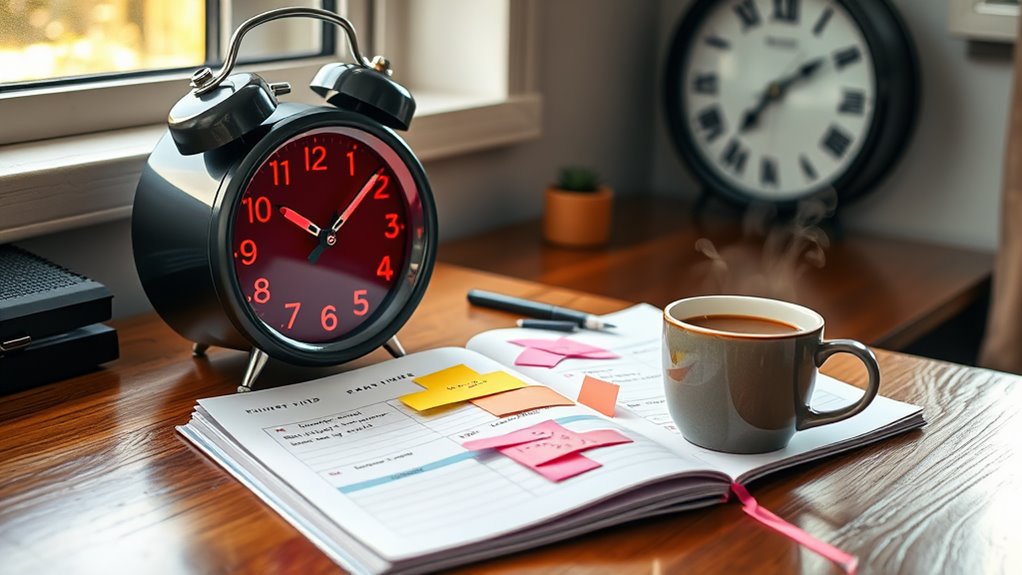Time Management Hacks for People Who Are Always Late
If you’re often late, time management hacks can help you turn things around. Start by creating a prioritized to-do list to organize your tasks and break larger projects into smaller steps to avoid overwhelm. Use tools like Google Calendar for scheduling and set reminders to keep you on track. Consider adjusting your clocks ahead to create a buffer, and establish routines that allow extra time for each task. Reflect on your emotional triggers related to lateness to better understand your habits. Keep exploring these strategies, and you’ll uncover even more ways to improve your punctuality.
Key Takeaways
- Set your clocks ahead by 10-15 minutes to create a buffer for timely departures.
- Create a prioritized to-do list to manage your daily tasks effectively.
- Break larger tasks into smaller steps to reduce feelings of overwhelm and procrastination.
- Utilize digital tools like Google Calendar and Todoist for better organization and reminders.
- Establish consistent routines that account for extra time per task to improve punctuality.
Understanding Chronic Lateness
Chronic lateness isn’t just a bad habit; it can stem from deeper issues like poor time perception or overwhelming schedules. You might find yourself constantly running behind, not because you don’t care, but because managing your time feels intimidating.
It’s easy to underestimate how long tasks will take or overcommit to activities, leading to chaos. You may struggle to prioritize, leaving you scrambling at the last minute. Recognizing your patterns is essential.
Consider tracking your time and identifying where you lose it. By understanding your challenges, you can implement effective strategies to improve your time management. Simple adjustments, like setting reminders or breaking tasks into smaller steps, can make a significant difference in your punctuality and overall stress levels.
Psychological Factors Behind Delay
When you think about delays, it’s easy to attribute them solely to poor planning or lack of organization, but psychological factors play a significant role too.
You might struggle with perfectionism, feeling overwhelmed by the need to do things flawlessly. This can lead to procrastination, as you avoid starting tasks that seem intimidating.
Additionally, if you’re an optimist, you may underestimate how long tasks will take, causing you to run late.
Fear of missing out or overcommitting can also divert your attention, making it hard to prioritize.
Finally, anxiety can create a sense of paralysis, making it difficult to leave the house on time.
Effective Daily Planning Techniques
Effective daily planning techniques can greatly enhance your productivity and help you manage your time more efficiently.
Start each day by creating a to-do list that prioritizes tasks based on urgency and importance. Break larger tasks into smaller, manageable steps to avoid feeling overwhelmed.
Use time blocks to allocate specific periods for each task, ensuring you stay focused and on track. Review your progress at the end of the day, adjusting your approach as needed for the next day.
Don’t forget to include short breaks to recharge your mind. By sticking to a consistent planning routine, you’ll find it easier to meet deadlines and reduce the stress of last-minute rushing.
Implementing these strategies can transform your daily schedule.
Time Management Tools and Apps
In today’s fast-paced world, time management tools and apps can be game-changers for boosting your productivity. Using these resources helps you stay organized and focused on your goals. From to-do lists to calendar apps, there’s something for everyone.
Here’s a quick comparison of some popular tools:
| Tool/App | Best For |
|---|---|
| Todoist | Task management |
| Trello | Project organization |
| Google Calendar | Scheduling and reminders |
| Pomodoro Timer | Time blocking techniques |
Transforming Your Punctuality Habits
How often do you find yourself rushing to make it on time? It’s stressful and exhausting, but transforming your punctuality habits can change that.
Start by setting your clocks ahead; this small trick gives you a mental buffer. Establish a routine that allows extra time for each task, and prioritize your commitments.
Here are some emotional triggers to reflect on:
- The stress of being late feels overwhelming.
- Missing out on important moments can haunt you.
- Disappointing friends or colleagues can weigh heavy on your heart.
- The embarrassment of arriving late is hard to shake.
- Regret lingers when you let opportunities slip away.
Frequently Asked Questions
What Are Common Excuses for Being Late?
You’ve probably heard common excuses for being late, like traffic, oversleeping, or last-minute tasks. People often say they lost track of time or forgot an appointment, but those reasons can get old fast.
How Does Chronic Lateness Affect Relationships?
Chronic lateness can strain your relationships, causing frustration and disappointment. Friends and family may feel undervalued or unimportant, leading to resentment. You might find yourself losing trust and respect from those who care about you.
Can Personality Types Influence Punctuality?
Absolutely, your personality type can influence punctuality. For instance, if you’re spontaneous, you might struggle with timeliness, while a more conscientious person often prioritizes being on time. Recognizing this can help you adjust your habits.
What Are the Long-Term Effects of Habitual Lateness?
Habitual lateness can strain relationships, diminish trust, and create stress. You might miss opportunities or face consequences at work. Over time, these patterns can lead to a negative self-image and affect your overall well-being.
Are There Cultural Differences in Perceptions of Punctuality?
You’ll notice that cultures differ markedly in their views on punctuality. In some places, being late’s acceptable, while others see it as disrespectful. Understanding these differences can help you navigate social situations more effectively.





